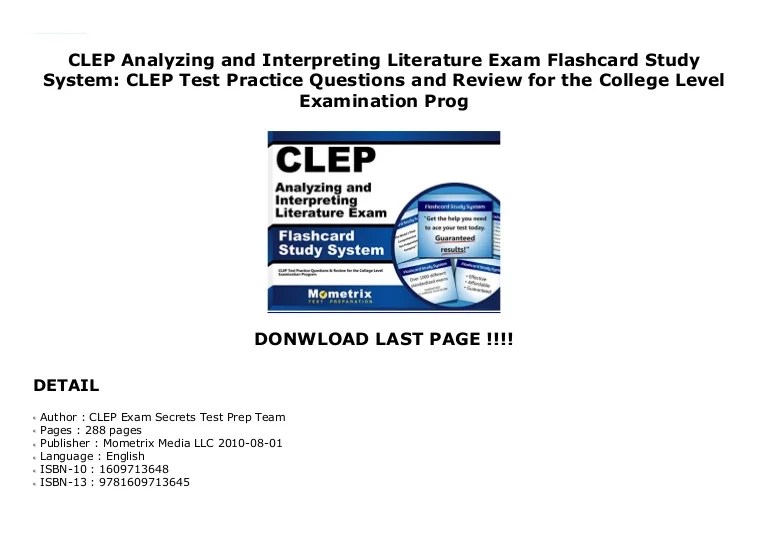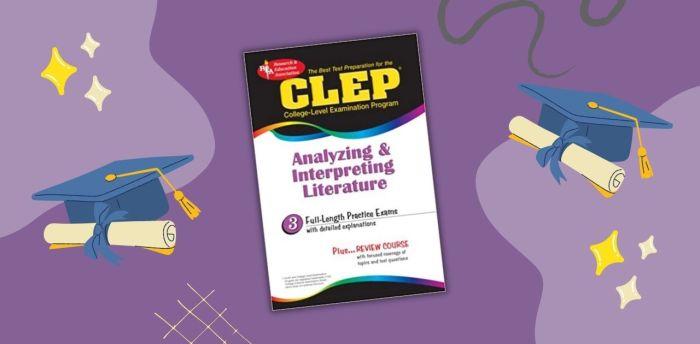Analyzing and interpreting literature clep practice questions – Embarking on a journey of literary analysis and interpretation, this guide unveils the intricacies of CLEP practice questions, empowering students to conquer this academic challenge with confidence and precision.
Delving into the depths of literature, we will explore effective strategies for identifying key themes, deciphering symbols, and unraveling the complexities of literary devices.
Overview of CLEP Practice Questions

CLEP practice questions are designed to help students prepare for the College Level Examination Program (CLEP) exams. These exams are used to measure a student’s knowledge and skills in a variety of subjects, including literature.
CLEP practice questions typically consist of a passage of text followed by a series of multiple-choice questions. The questions are designed to test a student’s understanding of the passage, as well as their ability to analyze and interpret literature.
Benefits of Using CLEP Practice Questions
- Help students identify areas where they need to improve their understanding of literature.
- Provide students with an opportunity to practice analyzing and interpreting literature.
- Boost students’ confidence on test day.
Analyzing Literature in CLEP Practice Questions
When analyzing literature in CLEP practice questions, it is important to:
- Identify the main idea or theme of the passage.
- Identify the key symbols and literary devices used in the passage.
- Consider the author’s purpose for writing the passage.
- Consider the context in which the passage was written.
Strategies for Analyzing Literature
- Read the passage carefully and identify the main idea.
- Underline or highlight key words and phrases.
- Make notes in the margins of the passage.
- Draw a diagram or mind map to connect the different ideas in the passage.
Interpreting Literature in CLEP Practice Questions: Analyzing And Interpreting Literature Clep Practice Questions

When interpreting literature in CLEP practice questions, it is important to:
- Consider the author’s intent.
- Consider the reader’s response to the passage.
- Consider the cultural and historical context of the passage.
Tips for Interpreting Literature, Analyzing and interpreting literature clep practice questions
- Read the passage multiple times.
- Write down your thoughts and feelings about the passage.
- Discuss the passage with others.
- Research the author and the cultural and historical context of the passage.
Common Challenges in Analyzing and Interpreting Literature

Some common challenges that students face when analyzing and interpreting literature include:
- Identifying the main idea of a passage.
- Understanding the use of symbolism and literary devices.
- Considering the author’s purpose and intent.
- Interpreting the passage in a way that is consistent with the author’s intent.
Solutions and Strategies for Overcoming Challenges
- Practice reading and analyzing literature.
- Attend a literature class or workshop.
- Read books and articles about literature.
- Talk to your teacher or professor about the challenges you are facing.
Practice Questions and Examples
| Question | Answer |
|---|---|
| What is the main idea of the passage? | The main idea of the passage is that literature can be used to explore the human condition. |
| What are the key symbols used in the passage? | The key symbols used in the passage are the sun and the moon. |
| What is the author’s purpose for writing the passage? | The author’s purpose for writing the passage is to persuade the reader that literature is a valuable tool for understanding the human condition. |
Additional Resources
User Queries
What is the purpose of CLEP practice questions?
CLEP practice questions provide students with an opportunity to familiarize themselves with the format, content, and difficulty level of the actual CLEP exam.
How can I effectively analyze literature in CLEP practice questions?
To effectively analyze literature in CLEP practice questions, focus on identifying key themes, symbols, and literary devices. Consider the author’s purpose, the historical context, and your own personal interpretation.
What are some common challenges in interpreting literature?
Common challenges in interpreting literature include understanding complex language, deciphering ambiguous meanings, and grappling with unfamiliar cultural references.